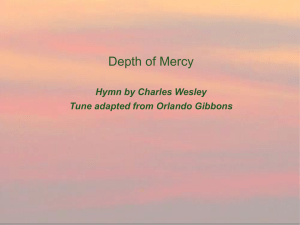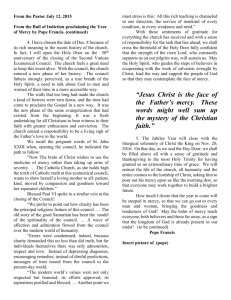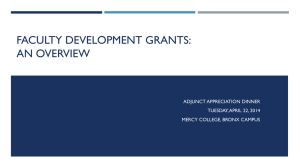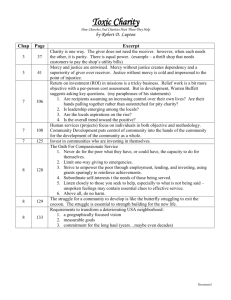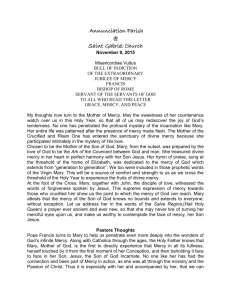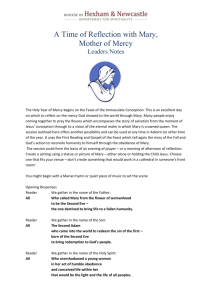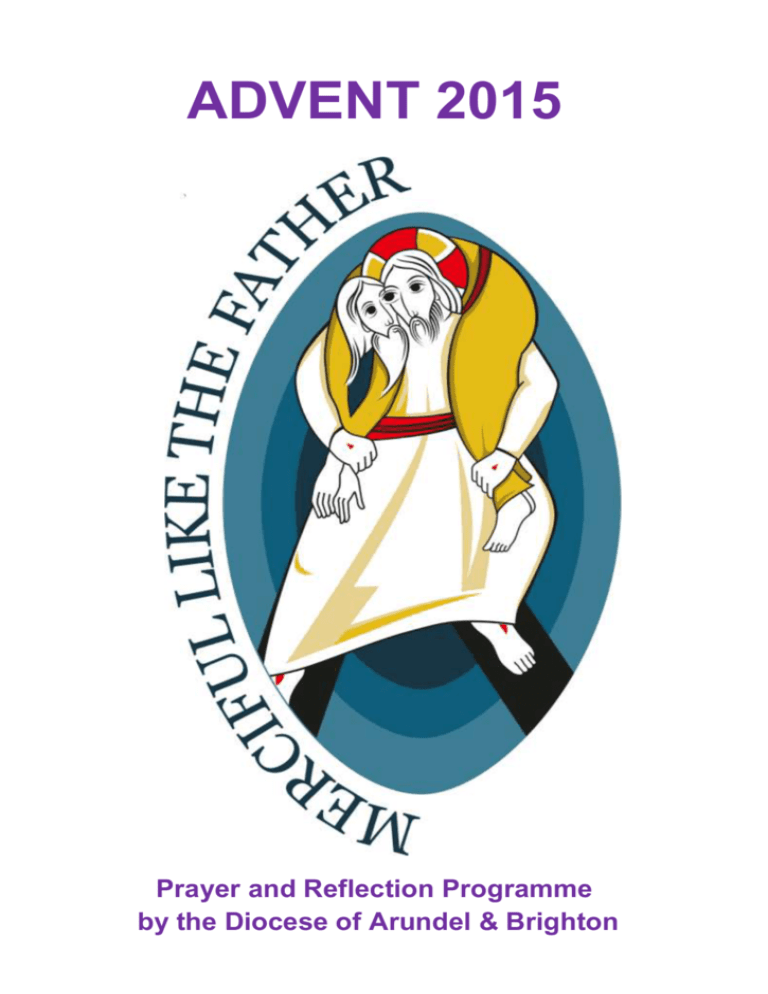
ADVENT 2015
Prayer and Reflection Programme
by the Diocese of Arundel & Brighton
Prayer of Pope Francis for the Jubilee Year of Mercy
Lord Jesus Christ,
you have taught us to be merciful like the heavenly Father,
and have told us that whoever sees you sees Him.
Show us your face and we will be saved.
Your loving gaze freed Zacchaeus and Matthew
from being enslaved by money;
the adulteress and Magdalene
from seeking happiness only in created things;
made Peter weep after his betrayal,
and assured Paradise to the repentant thief.
Let us hear, as if addressed to each one of us,
the words that you spoke to the Samaritan woman:
“If you knew the gift of God!”
You are the visible face of the invisible Father,
of the God who manifests his power
above all by forgiveness and mercy:
let the Church be your visible face in the world,
its Lord risen and glorified.
You willed that your ministers would also be clothed in weakness
in order that they may feel compassion
for those in ignorance and error:
let everyone who approaches them
feel sought after, loved, and forgiven by God.
Send your Spirit and consecrate every one of us with its anointing,
so that the Jubilee of Mercy may be a year of grace from the Lord,
and your Church, with renewed enthusiasm,
may bring good news to the poor,
proclaim liberty to captives and the oppressed,
and restore sight to the blind.
We ask this of you, Lord Jesus,
through the intercession of Mary, Mother of Mercy;
you who live and reign
with the Father and the Holy Spirit for ever and ever.
Amen
Introduction
The format for this year's Advent prayer and reflection programme is
inspired by the Year of Mercy which begins on the 8th of December
2015. Each week we will reflect on a key passage from the Gospel of
Luke (known as the Gospel of Mercy) concerning the incarnation of Our
Lord; from the moment Mary is greeted by the angel Gabriel until the
birth of Jesus in Bethlehem.
Week 1: The Annunciation
Week 2: The Visitation and the Magnificat
Week 3: The Birth of John the Baptist and the Benedictus
Week 4: The Nativity and the Visit of the Shepherds
It is suggested that these Scripture passages are read in the light of the
theme of the Year of Mercy, called for by Pope Francis. The Scripture
reflections draw on excerpts from the Papal Bull, Misericordiae Vultus
(MV) which proclaimed the Jubilee Year of Mercy. The complete text of
the Misericordiae Vultus is available on the official website of the
Jubilee (www.im.va) or as a booklet from the DABCEC bookshop.
As the focus of the programme is not lectionary based it can be used
flexibly in the Advent season.
The booklet is written primarily for group use, but there is no reason
why these should not be used for private reflection. The format each
week is:
A. Opening Prayer
B. Gospel
C. Psalm
D. Closing Prayer
- Using the Year of Mercy Prayer
- With reflection
- Optional prayer with Responsorial Psalm
- Intercessions followed by the Salve Regina
Please feel free to adapt the material to your needs and tastes.
Feedback from previous years shows that groups usually profit by
adapting the booklet to suit their own situation. This can be done in a
variety of ways, for example, by including a hymn, or additional prayers,
or if time allows, reflecting on additional readings of the Sunday etc.
For further advice on how best to use the material, contact David Wills.
Tel: 01293 651157
E-mail: david.wills@dabnet.org
Year of Mercy Logo
(Front Cover of Booklet)
The image representing the official Vatican logo for the Year of Mercy
has been provided by the Jesuit artist Father Marko Rupnik. Known for
his colourful mosaics, Fr Rupnik has chosen the icon, an art form
popular in sacred art for portraying the invisible Father as the visible
Christ, and a design that should get us talking.
The logo presents a small summa theologiae of the theme of mercy. In
fact, it represents an image quite important to the early Church: that of
the Son having taken upon his shoulders the lost soul demonstrating
that it is the love of Christ that brings to completion the mystery of his
incarnation culminating in redemption. The logo has been designed in
such a way so as to express the profound way in which the Good
Shepherd touches the flesh of humanity and does so with a love with
the power to change one’s life. One particular feature worthy of note is
that while the Good Shepherd, in his great mercy, takes humanity upon
himself, his eyes are merged with those of man. Christ sees with the
eyes of Adam, and Adam with the eyes of Christ. Every person
discovers in Christ, the new Adam, one’s own humanity and the future
that lies ahead, contemplating, in his gaze, the love of the Father.
The scene is captured within the so called mandorla (the shape of an
almond), a figure quite important in early and medieval iconography, for
it calls to mind the two natures of Christ, divine and human. The three
concentric ovals, with colours progressively lighter as we move
outward, suggest the movement of Christ who carries humanity out of
the night of sin and death. Conversely, the depth of the darker colour
suggests the impenetrability of the love of the Father who forgives all.
The logo and the motto together provide a fitting summary of what the
Jubilee Year is all about. The motto Merciful Like the Father (taken from
the Gospel of Luke, 6:36) serves as an invitation to follow the merciful
example of the Father who asks us not to judge or condemn but to
forgive and to give love and forgiveness without measure (cf. Lk 6:3738).
The logo deserves a long look and to return to it again and again, as we
explore and experience God's mercy in our lives during this Year of
Mercy.
Week 1 - The Annunciation
A.
WELCOME AND OPENING PRAYER
Make sure that all the group know each other’s names. Discuss a little why
people have come and what they hope to gain from the group. An Advent
wreath, an empty crib, Bible, icon or simply a candle can be used as a focal
point for the group.
After a few moments of silence we suggest you use the Year of Mercy Prayer
found on the inside cover of this booklet to begin your time together.
As this is your first meeting take some time to reflect on the words of the
prayer, allow members of the group 2-3 minutes to re- read silently and then
invite each person to share what strikes you about the prayer.
B.
Gospel (Luke 1:26-38)
Agree for a group member to read the passage aloud, and then take 2-3
minutes to reflect in silence on what you have heard. If you wish, share a
word or phrase which has struck you or a thought which has occurred to
you, but this is a time for prayerful contemplation, not discussion.
The Birth of Jesus Foretold
26
In the sixth month the angel Gabriel was sent by God to a town in Galilee
called Nazareth, 27 to a virgin engaged to a man whose name was Joseph, of the
house of David. The virgin’s name was Mary. 28 And he came to her and said,
“Greetings, favoured one! The Lord is with you.” 29 But she was much
perplexed by his words and pondered what sort of greeting this might be.
30
The angel said to her, “Do not be afraid, Mary, for you have found favour
with God. 31 And now, you will conceive in your womb and bear a son, and
you will name him Jesus. 32 He will be great, and will be called the Son of the
Most High, and the Lord God will give to him the throne of his ancestor David.
33
He will reign over the house of Jacob forever, and of his kingdom there will
be no end.” 34 Mary said to the angel, “How can this be, since I am a virgin?”
35
The angel said to her, “The Holy Spirit will come upon you, and the power
of the Most High will overshadow you; therefore the child to be born will be
holy; he will be called Son of God. 36 And now, your relative Elizabeth in her
old age has also conceived a son; and this is the sixth month for her who was
said to be barren. 37 For nothing will be impossible with God.” 38 Then Mary
said, “Here am I, the servant of the Lord; let it be with me according to your
word.” Then the angel departed from her.
Reflection on Gospel Luke 1:26-38
The Angel Gabriel is sent by God to a virgin called Mary; Gabriel enters
Mary’s house but it is also the door of her heart that is open to God. Doors are
a recurring theme in this forthcoming Year of Mercy. We are invited to make a
pilgrimage through one of the Holy Doors that will be opened. Like Mary we
are called to open doors of our hearts to the mercy of God.
The Holy Year begins on the 8th of December, the Solemnity of the
Immaculate Conception, and we are reminded that God acts from the very
beginning of human history. “After the sin of Adam and Eve, God did not wish
to leave humanity alone in the throes of evil. So he turned his gaze to Mary,
holy and immaculate in love (cf. Eph 1.4), choosing her to be the Mother of
man’s redeemer.” [MV 3].
At the Annunciation, God’s mercy breaks into the world in a unique and
wonderful way. “When faced with the gravity of sin, God responds with the
fullness of mercy.” [MV 3] With Mary's fiat she co-operates with God in
bringing Mercy into the world and so we rightly give her the title, Mother of
Mercy. We too as disciples of Jesus Christ are called to co-operate with God so
that Mercy flows into the world around and through us.
The Angel Gabriel also gives news of the mercy that has been shown to
Elizabeth for "nothing is impossible with God". This is an important reminder
as we seek God's mercy for what may seem to us "impossible situations".
Time to reflect and share thoughts on the above
C.
Optional Prayer with Psalm for the 1st Sunday of Advent
All say together Psalm 24
Response: To you, O Lord, I lift up my soul.
Lord, make me know your ways.
Lord, teach me your paths.
Make me walk in your truth, and teach me:
for you are God my saviour.
The Lord is good and upright.
He shows the path to those who stray,
he guides the humble in the right path;
he teaches his way to the poor.
His ways are faithfulness and love
for those who keep his covenant and will.
The Lord’s friendship is for those who revere him;
to them he reveals his covenant.
D.
Concluding Prayer:
Spend a few minutes praying for the intentions of the group and the world, and
then pray together asking the intercession of Our Lady as proposed by Pope
Francis:
Mary attests that the mercy of the Son of God knows no bounds and extends to
everyone, without exception. Let us address her in the words of the Salve
Regina, a prayer ever ancient and ever new, so that she may never tire of
turning her merciful eyes upon us, and make us worthy to contemplate the face
of mercy, her Son Jesus.
(MV 24)
SALVE REGINA (Hail Holy Queen) - Prayer for the Year of Mercy
Hail, Holy Queen, Mother of Mercy,
Hail our life, our sweetness and our hope.
To thee do we cry,
poor banished children of Eve;
To thee do we send up our sighs,
mourning and weeping in this valley of tears.
Turn then, most gracious advocate,
thine eyes of mercy toward us;
and after this our exile
show unto us the blessed fruit of thy womb, Jesus.
O clement, O loving, O sweet Virgin Mary!
Week 2: The Visitation and the Magnificat
A. Welcome and Opening Prayer:
Light the group candle (or wreath).
After a few moments of silence we suggest you use the Year of Mercy Prayer
found on the inside cover of this booklet to begin your time together.
B.
Gospel (Luke 1:39-56)
Ask a group member to read the passage aloud and then take 2-3 minutes to
reflect in silence on what you have heard. If you wish, share a phrase which
has struck you or a thought which has occurred to you, but this is a time for
prayerful contemplation, not discussion. If not everyone has a copy of the text
available it may be useful to read the passage through once more, aloud.
Part 1 - Mary Visits Elizabeth
39
In those days Mary set out and went with haste to a Judean town in the hill
country, 40 where she entered the house of Zechariah and greeted Elizabeth.
41
When Elizabeth heard Mary’s greeting, the child leaped in her womb. And
Elizabeth was filled with the Holy Spirit 42 and exclaimed with a loud cry,
“Blessed are you among women, and blessed is the fruit of your womb. 43 And
why has this happened to me, that the mother of my Lord comes to me? 44 For
as soon as I heard the sound of your greeting, the child in my womb leaped for
joy. 45 And blessed is she who believed that there would be a fulfilment of what
was spoken to her by the Lord.”
Reflection
As soon as Mary has received the message of Gabriel and is pregnant with the
“Son of the Most High”, she sets out to visit the Elizabeth as she, too, is
pregnant despite being thought “barren” and “in her old age”. These two
pregnancies are linked by God’s intervention, in different ways, in human
history. Despite the dangers involved in travelling, Mary is driven by joy and
wonder to visit her “kinswoman”.
When Elizabeth hears Mary’s greeting she is filled with the Holy Spirit and the
child in her womb leaps for joy. This whole episode of the Gospel is steeped in
the presence of the Holy Spirit. Two women respond in their different ways to
the power of God. Elizabeth’s response to Mary gives us the heart of the Hail
Mary, the prayer beloved of Catholics and other Christians through the ages.
“Blessed are you among women, and blessed is the fruit of your womb.”
The mercy of God towards fallen humanity culminates in the incarnation of
His Son. Mary is chosen to be “Ark of the Covenant between God and man”
[MV 24]. Again and again, the power of God calls human beings to co-operate
in His divine plan to save us from ourselves and sin. Mary is filled with the
mercy of God, his Son Jesus Christ. Mary is driven to share that mercy, first
with her cousin Elizabeth and, then, with the whole world.
If we are truly open to God’s presence and mercy as Mary is, then we will be
inspired to share that mercy with those around us.
Time to reflect and share thoughts on the above
Part 2 - Mary’s Song of Praise
46
And Mary said,
“My soul magnifies the Lord,
47
and my spirit rejoices in God my Saviour,
48
for he has looked with favour on the lowliness of his servant.
Surely, from now on all generations will call me blessed;
49
for the Mighty One has done great things for me,
and holy is his name.
50
His mercy is for those who fear him
from generation to generation.
51
He has shown strength with his arm;
he has scattered the proud in the thoughts of their hearts.
52
He has brought down the powerful from their thrones,
and lifted up the lowly;
53
he has filled the hungry with good things,
and sent the rich away empty.
54
He has helped his servant Israel,
in remembrance of his mercy,
55
according to the promise he made to our ancestors,
to Abraham and to his descendants forever.”
56
And Mary remained with her about three months and then returned to her
home.
Reflection
Mary’s joy in the Lord spills out into the great Magnificat which the Church
sings every evening. As Pope Francis reminds us, “Her hymn of praise… was
dedicated to the mercy of God which extends from ‘generation to generation’
[Lk 1.50]” [MV 24]
Mary’s paean of praise echoes the Song of Hannah (1 Samuel 2.1-10). Luke
seems to be reminding us that Mary (along with John the Baptist) is the
culmination of the Hebrew Scriptures as much as she is the beginning of the
New Testament. As she says “My soul proclaims the greatness of the Lord”,
Mary points to the mercy of God made flesh in Christ. This mercy turns the
world and its values on their head. The powerful are deposed and the powerless are “exalted”.
Mary sings of God’s mercy being always present in our world for those who
reach out to Him. “His mercy reaches from age to age for those who fear him.”
[Lk 1.50] The whole Magnificat sings of what God does for His people. He is
no absentee Deity. God’s grace and mercy is poured out on us, if only we
would turn to Him.
Pope Francis says, “[Mary] treasured Divine Mercy in her heart in perfect
harmony with her Son Jesus” [MV 24]. It is as if she cannot keep this mercy to
herself. The Magnificat erupts as a Holy Spirit driven canticle. The Divine
Mercy cannot be contained and it flows from Mary’s lips. We, too, are called
to vessels of His mercy, in our words and deeds. With Mary, “The Church
feels the urgent need to proclaim God’s mercy. Her life is authentic and
credible only when she becomes a convincing herald of mercy.” [MV 25]
Time to reflect and share thoughts on the above
C.
Optional Prayer with Psalm for the 2nd Sunday of Advent
All say together Psalm 125
Response: What marvels the Lord worked for us!
Indeed we were glad.
When the Lord delivered Zion from bondage,
it seemed like a dream.
Then was our mouth filled with laughter,
on our lips there were songs.
The heathens themselves said: “What marvels
the Lord worked for them!”
What marvels the Lord worked for us!
Indeed we were glad.
Deliver us, O Lord, from our bondage
as streams in dry land.
Those who are sowing in tears
will sing when they reap.
They go out, they go out, full of tears,
carrying seed for the sowing:
they come back, they come back, full of song,
carrying their sheaves.
D.
Concluding Prayer:
Spend a few minutes praying for the intentions of the group and the world, and
then pray together asking the intercession of Our Lady as proposed by Pope
Francis:
Mary attests that the mercy of the Son of God knows no bounds and extends to
everyone, without exception. Let us address her in the words of the Salve
Regina, a prayer ever ancient and ever new, so that she may never tire of
turning her merciful eyes upon us, and make us worthy to contemplate the face
of mercy, her Son Jesus.
(MV 24)
SALVE REGINA (Hail Holy Queen) - Prayer for the Year of Mercy
Hail, Holy Queen, Mother of Mercy,
Hail our life, our sweetness and our hope.
To thee do we cry,
poor banished children of Eve;
To thee do we send up our sighs,
mourning and weeping in this valley of tears.
Turn then, most gracious advocate,
thine eyes of mercy toward us;
and after this our exile
show unto us the blessed fruit of thy womb, Jesus.
O clement, O loving, O sweet Virgin Mary!
Week Three: The Birth of John the Baptist & Benedictus
A. Welcome and Opening Prayer:
Light the group candle (or wreath).
After a few moments of silence we suggest you use the Year of Mercy Prayer
found on the inside cover of this booklet to begin your time together.
B.
Gospel (Luke 1:57-80)
Ask a group member to read the passage aloud and then take 2-3 minutes to
reflect in silence on what you have heard. If you wish, share a phrase which
has struck you or a thought which has occurred to you, but this is a time for
prayerful contemplation, not discussion. If not everyone has a copy of the text
available it may be useful to read the passage through once more, aloud.
The Birth of John the Baptist
57
Now the time came for Elizabeth to give birth, and she bore a son. 58 Her
neighbours and relatives heard that the Lord had shown his great mercy to her,
and they rejoiced with her.
59
On the eighth day they came to circumcise the child, and they were going to
name him Zechariah after his father. 60 But his mother said, “No; he is to be
called John.” 61 They said to her, “None of your relatives has this name.”
62
Then they began motioning to his father to find out what name he wanted to
give him. 63 He asked for a writing tablet and wrote, “His name is John.” And
all of them were amazed. 64 Immediately his mouth was opened and his tongue
freed, and he began to speak, praising God. 65 Fear came over all their
neighbours, and all these things were talked about throughout the entire hill
country of Judea. 66 All who heard them pondered them and said, “What then
will this child become?” For, indeed, the hand of the Lord was with him.
Reflection
The birth of John the Baptist is an occasion of rejoicing. Elizabeth was
thought to be unable to have children – at a time when the lack of children was
the cause of rejection by the people of the village and a sign that God had
withdrawn his favour. The arrival of the child for Elizabeth and Zechariah
was, then, a time of real joy for them and for all in their town in the hill
country of Judea.
It is also a time of wonder – the choice of a name not used in the family and
the spectacular return of the power of speech for Zechariah. Signs and
wonders abound for the people and this was a sure indication that this newborn
was no ordinary child. The talk of this child spreads around the countryside.
God’s mercy to Elizabeth and Zechariah is beyond their expectations – a child
in whom they and their friends rejoice. More than that, however, this child is
one specially chosen by God for a particular purpose – to point the way to the
Saviour himself.
We are called to be open to the wonder of the action of the God who loves us
and each one of us, in our own time, is called to show others the way to Jesus.
In this Year of Mercy, we have a particular call to enable others to the find the
life and love that is in Christ alone.
Time to reflect and share thoughts on the above
Part 2 - The Benedictus
67
Then his father Zechariah was filled with the Holy Spirit and spoke this
prophecy:
“Blessed be the Lord God of Israel,
for he has looked favourably on his people and redeemed them.
69
He has raised up a mighty saviour for us
in the house of his servant David,
70
as he spoke through the mouth of his holy prophets from of old,
71
that we would be saved from our enemies and from the hand of all who
hate us.
72
Thus he has shown the mercy promised to our ancestors,
and has remembered his holy covenant,
73
the oath that he swore to our ancestor Abraham,
to grant us 74 that we, being rescued from the hands of our enemies,
might serve him without fear, 75 in holiness and righteousness
before him all our days.
76
And you, child, will be called the prophet of the Most High;
for you will go before the Lord to prepare his ways,
77
to give knowledge of salvation to his people
by the forgiveness of their sins.
78
By the tender mercy of our God,
the dawn from on high will break upon us,
68
79
to give light to those who sit in darkness and in the shadow of death,
to guide our feet into the way of peace.”
80
The child grew and became strong in spirit, and he was in the wilderness
until the day he appeared publicly to Israel.
Reflection
Zechariah’s response to the birth of his son is to use his newly returned gift of
speech in the praise of God. He proclaims God’s blessing on his people and
his prophecy speaks of the coming of the Messiah. Some of his words remind
us of Mary’s hymn of praise, the Magnificat, especially in his reference to the
covenant with Abraham – he speaks of the fulfilment of the Old Covenant in
the One who is to come.
He speaks, too, of the role of his own son as the one who brings to a
conclusion the work of the prophets of old, for John the Baptist is to prepare
the way for the Saviour Himself, through the call to repentance.
We must be open the door of our hearts to that call to repentance and the gift of
forgiveness – highlighted for us in this Jubilee Year. Only if we know the
experience of God’s forgiving love can be bearers of that love for others.
Time to reflect and share thoughts on the above
C.
Optional Prayer with Canticle for the 3rd Sunday of Advent
All say together the Canticle - Isaiah 12:2-6:
Response: Sing and shout for joy
for great in your midst is the Holy One of Israel
Truly, God is my salvation,
I trust, I shall not fear.
For the Lord is my strength, my song,
he became my Saviour.
With joy you will draw water
from the wells of salvation.
Give thanks to the Lord, give praise to his name!
make his mighty deeds known to the peoples!
Declare the greatness of his name.
Sing a psalm to the Lord
for he has done glorious deeds,
make them known to all the earth!
People of Zion, sing and shout for joy,
for great in your midst is the Holy One of Israel.
D.
Concluding Prayer:
Spend a few minutes praying for the intentions of the group and the world.
Then together asking the intercession of Our Lady as proposed by Pope
Francis:
Mary attests that the mercy of the Son of God knows no bounds and extends to
everyone, without exception. Let us address her in the words of the Salve
Regina, a prayer ever ancient and ever new, so that she may never tire of
turning her merciful eyes upon us, and make us worthy to contemplate the face
of mercy, her Son Jesus.
(MV 24)
SALVE REGINA (Hail Holy Queen) - Prayer for the Year of Mercy
Hail, Holy Queen, Mother of Mercy,
Hail our life, our sweetness and our hope.
To thee do we cry,
poor banished children of Eve;
To thee do we send up our sighs,
mourning and weeping in this valley of tears.
Turn then, most gracious advocate,
thine eyes of mercy toward us;
and after this our exile
show unto us the blessed fruit of thy womb, Jesus.
O clement, O loving, O sweet Virgin Mary!
Week Four: The Nativity and the Visit of the Shepherds
A.
Welcome and Opening Prayer:
Light the group candle (or wreath).
After a few moments of silence we suggest you use the Year of Mercy Prayer
found on the inside cover of this booklet to begin your time together.
B.
Gospel (Luke 2:1-20)
Ask a group member to read the passage aloud and then take 2-3 minutes to
reflect in silence on what you have heard. If you wish, share a phrase which
has struck you or a thought which has occurred to you, but this is a time for
prayerful contemplation, not discussion. Then read the passage through once
more, aloud.
Part 1 - The Birth of Jesus
2 1In those days a decree went out from Emperor Augustus that all the world
should be registered. 2 This was the first registration and was taken while
Quirinius was governor of Syria. 3 All went to their own towns to be registered.
4
Joseph also went from the town of Nazareth in Galilee to Judea, to the city of
David called Bethlehem, because he was descended from the house and family
of David. 5 He went to be registered with Mary, to whom he was engaged and
who was expecting a child. 6 While they were there, the time came for her to
deliver her child. 7 And she gave birth to her firstborn son and wrapped him in
bands of cloth, and laid him in a manger, because there was no place for them
in the inn.
Reflection
Although the dates Luke gives do not match contemporary records, his
intention is clearly to root the birth of Jesus at a particular place and in a
particular time. God, the eternal Father, acts in human history. Mary gives
birth to Jesus, the bread of life in Bethlehem, House of Bread. As Pope
Benedict XVI reminds us, “Augustine drew out the meaning of the manger…
[It] is the place where animals find their food. But now, lying in the manger, is
he who called himself the true bread come down from heaven, the true
nourishment we need in order to be fully ourselves.” [The Infancy Narratives:
Jesus of Nazareth, Joseph Ratzinger, p. 68]
The whole Infancy Narrative is soaked in symbols pointing to God fulfilling
the prophecies of the Old Testament. “Jesus Christ is the face of the Father’s
mercy” [MV1] and that mercy cannot be contained in Bethlehem
God’s mercy works through a powerless young girl, Mary, as far away from
the power of the Roman Empire as you can get.
Time to reflect and share thoughts on the above
Part 2 - The Shepherds and the Angels
8
In that region there were shepherds living in the fields, keeping watch over
their flock by night. 9 Then an angel of the Lord stood before them, and the
glory of the Lord shone around them, and they were terrified. 10 But the angel
said to them, “Do not be afraid; for see—I am bringing you good news of great
joy for all the people: 11 to you is born this day in the city of David a Saviour,
who is the Messiah, the Lord. 12 This will be a sign for you: you will find a
child wrapped in bands of cloth and lying in a manger.” 13 And suddenly there
was with the angel a multitude of the heavenly host, praising God and saying,
14
“Glory to God in the highest heaven,
and on earth peace among those whom he favours!”
15
When the angels had left them and gone into heaven, the shepherds said to
one another, “Let us go now to Bethlehem and see this thing that has taken
place, which the Lord has made known to us.” 16 So they went with haste and
found Mary and Joseph, and the child lying in the manger. 17 When they saw
this, they made known what had been told them about this child; 18 and all who
heard it were amazed at what the shepherds told them. 19 But Mary treasured all
these words and pondered them in her heart. 20 The shepherds returned,
glorifying and praising God for all they had heard and seen, as it had been told
them.
Reflection
The birth of a new king is not proclaimed in the courts of the powerful. God’s
mercy, incarnate in Jesus Christ, is first announced to humble shepherds. They
are, in the words of Nicholas King, “frankly cowboys, people living on the
margins of society… perhaps the very people Luke’s well-to-do Christians
would have had least in common with.” [Study Guide Series: The New
Testament Luke-Acts, p. 14]. The angel of the Lord appears for the third time in
Luke’s Gospel to announce the good news of Christ’s birth. Confronted with
the glory of the Lord, the shepherds are terrified. People who are considered to
be in the lower levels of society, far removed from the priests and lawyers, are
the first to hear the wonderful message.
The angel tells them not to be afraid and gives these shepherds a mission
because the news of great joy is a “joy to be shared by the whole people.” [Lk
2.10]. The angel is joined by “a great throng of the heavenly host, praising God
and singing: Glory to God in the highest heaven…” [Lk 2.13-14] Every time
we sing the Gloria at mass, we plead for God’s mercy. Mercy is found in the
person of Jesus Christ, true God and true man.
When the angels return to heaven, the shepherds “hurried” to find Jesus. At the
Annunciation, Mary “went as quickly as she could” to her kinswoman
Elizabeth. The Holy Spirit drives them in holy joy as they co-operate in their
different ways with God’s will.
When the shepherds had seen Jesus, they went back glorifying God. They are
changed by their encounter with Christ. Nothing will ever be the same, for
them or the world.
Pope Francis says, “In this Holy Year, we look forward to the experience of
opening our hearts to those living on the outermost fringes of society: fringes
which modern society itself creates.” [MV 14]. The shepherds remind us that
God chooses people on the margins not only to receive His mercy but also to
become messengers of His mercy to us all.
Time to reflect and share thoughts on the above
C.
Optional Prayer with Psalm for the 4th Sunday of Advent
All say together Psalm 79
Response:
God of hosts, bring us back;
let your face shine on us and we shall be saved.
O shepherd of Israel, hear us,
shine forth from your cherubim throne,
O Lord, rouse up your might,
O Lord, come to our help.
God of hosts, turn again, we implore,
look down from heaven and see.
Visit this vine and protect it,
the vine your right hand has planted.
May your hand be on the man you have chosen,
the man you have given your strength.
And we shall never forsake you again:
give us life that we may call upon your name.
D.
Concluding Prayer:
Spend a few minutes praying for the intentions of the group and the world.
Then together asking the intercession of Our Lady as proposed by Pope
Francis:
Mary attests that the mercy of the Son of God knows no bounds and extends to
everyone, without exception. Let us address her in the words of the Salve
Regina, a prayer ever ancient and ever new, so that she may never tire of
turning her merciful eyes upon us, and make us worthy to contemplate the face
of mercy, her Son Jesus. (MV 24)
SALVE REGINA (Hail Holy Queen) - Prayer for the Year of Mercy
Hail, Holy Queen, Mother of Mercy,
Hail our life, our sweetness and our hope.
To thee do we cry,
poor banished children of Eve;
To thee do we send up our sighs,
mourning and weeping in this valley of tears.
Turn then, most gracious advocate,
thine eyes of mercy toward us;
and after this our exile
show unto us the blessed fruit of thy womb, Jesus.
O clement, O loving, O sweet Virgin Mary!
Acknowledgements:
The text has been written by Bishop Richard Moth, David Swyer, Sue
Petritz and David Wills. Editing contributions were made by David Swyer
and David Wills.
Thanks, also, to the staff of the Christian Education Centre in Crawley for
their hard work in producing the booklet.
Grateful thanks are given for permission to use the following:
Translations of Psalms 24, 79, 125 & Canticle of Isaiah 12:2-6 from The
Psalms: A New Translation © 1963 The Grail (England) published by
HarperCollins.
All other Scripture quotations from New Revised Standard Version Bible,
copyright 1989, Division of Christian Education of the National Council of
the Churches of Christ in the United States of America. Used by permission.
All rights reserved.
All other texts © Diocese of Arundel & Brighton, 2015.
Text may be reproduced for personal use with acknowledgement.
COMING SOON!
LENT 2016 SMALL GROUPS
AVAILABLE JANUARY 2016
For Recommended Reading:
Contact DABCEC Bookshop
Tel: (01293) 651165
Email: bookshop@dabnet.org
Feedback Form
1. How did you obtain a copy?
a. Purchased booklet from DABCEC/parish
b. Downloaded from website
2. How did you use the material?
a. Group______________ (Size of Group) ________
b. Private reflection__________________________
3. How did you rate the material?
Score from 1(very poor) to 5 (excellent)
4. What did you most appreciate?
5. What needs further development?
6. Any further comments?
(Please use reverse if necessary)
Please return to: David Wills, DABCEC, 4 Southgate Drive, Crawley, West Sussex,
RH10 6RP or email david.wills@dabnet.org
The Announcement of the Jubilee of Mercy
24 hours for the Lord, Friday, March 13, 2015 - St Peter Basilica
Dear brothers and sisters, I have often thought of how the Church may
render more clear her mission to be a witness to mercy; and we have to
make this journey. It is a journey which begins with spiritual conversion.
Therefore, I have decided to announce an Extraordinary Jubilee which
has at its centre the mercy of God. It will be a Holy Year of Mercy. We
want to live in the light of the word of the Lord: “Be merciful, even as
your Father is merciful” (cf. Lk 6:36). And this especially applies to
confessors! So much mercy!
This Holy Year will commence on the next Solemnity of the Immaculate
Conception and will conclude on Sunday, 20 November 2016, the
Solemnity of Our Lord Jesus Christ, King of the Universe and living face
of the Father's mercy. I entrust the organization of this Jubilee to the
Pontifical Council for Promoting the New Evangelization, in order that it
may come to life as a new step on the Church’s journey in her mission to
bring the Gospel of mercy to each person.
I am confident that the whole Church, which is in such need of mercy for
we are sinners, will be able to find in this Jubilee the joy of rediscovering
and rendering fruitful God’s mercy, with which we are all called to give
comfort to every man and every woman of our time. Do not forget that
God forgives all, and God forgives always. Let us never tire of asking
forgiveness. Let us henceforth entrust this Year to the Mother of Mercy,
that she turn her gaze upon us and watch over our journey: our penitential
journey, our year-long journey with an open heart, to receive the
indulgence of God, to receive the mercy of God.
Pope Francis
Jubilee Year of Mercy – Opening the Holy Door
Join
Pope Francis will open the Holy Door in St Peter’s Basilica on December 8th,
to inaugurate the Jubilee Year of Mercy. On Sunday 13th December, Holy
Doors will be opened in every cathedral throughout the world.
Join Bishop Richard to celebrate a Mass
with the opening of the Holy Door
in Arundel Cathedral
on Sunday 13th December 2015
at 5.00pm,
beginning with a procession from the Cathedral Centre
Advent Group Discussion Material 2015
© Diocese of Arundel & Brighton
All Rights Reserved
Adult Formation Adviser – David Wills
Christian Education Centre 4 Southgate Drive Crawley RH10 6RP
Tel (01293) 651157 Fax (01293) 616945
Email david.wills@dabnet.org
Ordering Booklets
Booklets can be ordered from the DABCEC bookshop:
Tel (01293) 651165 Email bookshop@dabnet.org
A downloadable version is available from the diocesan website:
www.abdiocese.org.uk


